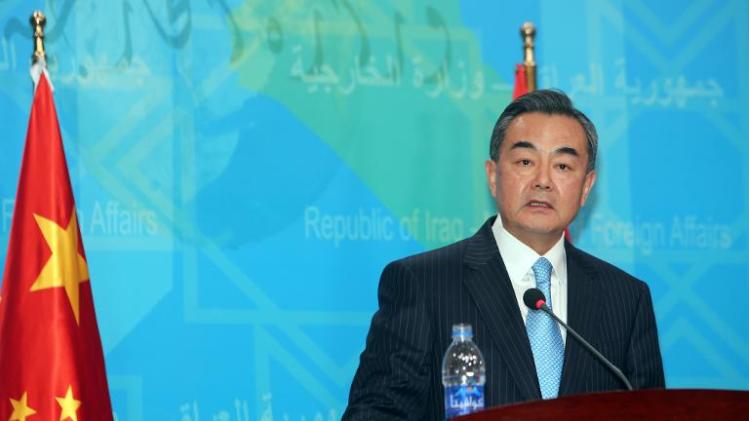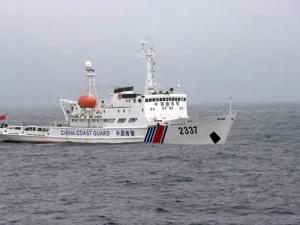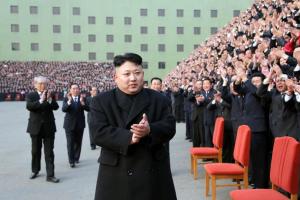Good People,
We saw this coming as a result of Museveni invasion to South Sudan
and his stubboness to heed to remove his Uganda troops from South
Sudan.
Both Museveni and Kagame will be forced to swallow a humble pie as
history will judged them fircely with consequences they must pay as a
result.
Fears S.Sudan conflict could infect region
AFP
By Hannah McNeish 19 hours ago
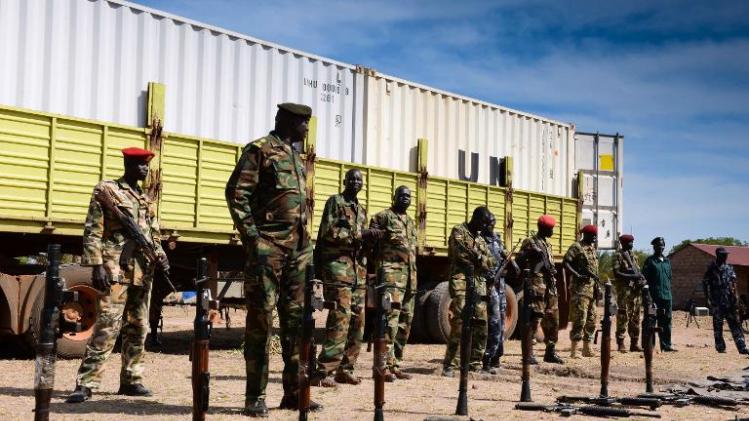
Juba (AFP) - As ongoing fighting in South Sudan shatters any pretence of a ceasefire between government troops and rebels, analysts fear the conflict could engulf the region, as former foes fight old wars in a new country.
There are tensions between South Sudan's northern neighbour and old enemy Sudan and its new ally Uganda, while chief mediator Ethiopia is likely alarmed by allegations that its arch-enemy Eritrea is funnelling weapons from ally Khartoum to South Sudan's rebels.
One Western diplomat, speaking on condition of anonymity, said that the worst case-scenario currently being discussed is that "you've got Uganda fighting Sudan inside South Sudan, with Eritrea fighting Ethiopia inside South Sudan and a complete law and order vacuum."
"As far as the regionalisation of the conflict goes, the question is not if, but when", said Casie Copeland, South Sudan analyst for the Brussels-based International Crisis Group think tank.
What started as a power struggle between South Sudan's President Salva Kiir and his former deputy Riek Machar in late December quickly split the army and exacerbated ethnic feelings in a nation born less than three years ago, after five decades of war with Khartoum.
A feud between Ugandan President Yoweri Museveni and his Sudanese counterpart Omar al-Bashir is rooted in Uganda's rescue of a then southern guerrilla army battling Khartoum forces in the last stages of the civil war that ended with a 2005 peace deal and South Sudan's independence six years later.
Uganda has long accused Khartoum of funding rebel groups such as the Lord's Resistance Army on its territory.
With Ugandan troops now openly backing Kiir and pushing north, and as rebels retake territory near oil fields whose produce flows north for export, Sudan could soon go on the offensive.
View gallery
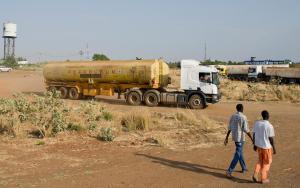
Two men walk on March 2, 2014 near the Paloch oil fields in Upper Nile State, the site of an oil com …
"We do worry about the regionalisation of this. The Ugandans and Sudanese hate each other," the diplomat said.
- Proxy armies -
Rebels from Sudan's troubled Darfur region, who have been battling Khartoum for a decade, are also reported to be fighting alongside South Sudan in oil-rich Unity state, and ethnic militia from other parts of the south are also pitching in, further straining north-south relations.
There are real fears that Sudan could revert to old tactics of funding proxies or arming the opposition as calls for Uganda to withdraw go unheeded and oil assets are threatened.
A row in early 2012 over how much South Sudan should pay to export its oil through northern pipelines to port led to an 18-month halt in production that brought both economies to their knees.
Kiir and Bashir eventually signed deals on oil and security that included a promise to stop funding one another's enemies to ensure their co-dependent stability.
The current conflict has called this and also the future of South Sudan's oil revenues into question, with many seeing newly oil-rich Uganda's military support as a bargaining chip for oil.
View gallery
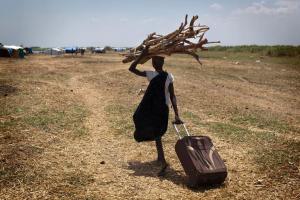
A South Sudanese woman walks with wood to reinforce her house in an isolated makeshift IDP camp for …
South Sudan's defence minister recently admitted that Ugandan troops were on the payroll, contradicting his colleagues' claims there were no foreign forces in country.
But speculation is rife over what else South Sudan's government -- still reeling from the shutdown -- has offered to secure its position.
"I heard one of the oil blocks, or so much (oil) per day", said the diplomat.
South Sudan's decision to build an alternative pipeline to Kenya or Djibouti further unnerved Khartoum and raised Uganda's hopes it might link up to an East African pipeline and build its own refinery.
With French oil giant Total owning concessions in Ethiopia, Uganda and South Sudan, "the pieces are there for big play", says Copeland.
- Risk of bankruptcy -
But for now, cash-strapped South Sudan is embroiled in a war that has displaced almost a million people, with many wondering how long the baby nation can last.
"International financial experts are suggesting that the government might be bankrupt in 2-3 months," said one analyst on condition of anonymity.
South Sudan's biggest oil-backer China has played a role in supporting the government financially with development projects and loans, and is now increasingly wading into internal politics.
But its weight is unlikely to cut through strained regional relations as paranoia over history repeating itself with regards to oil, guns and borders grows.
"A nightmare scenario is unfolding in this region", said John Prendergast in a recent report for the anti-genocide Enough project.
He has called for a proper investigation into whether Eritrea is providing arms through Sudan and for an extension of sanctions already incurred by Asmara for supplying weapons to Somali groups.
Until there is no "visible presence" of Ugandan forces in South Sudan, he doubts that peace talks in Ethiopia's capital Addis Ababa that the host and Sudan have backed will ever start in earnest.
But even without confused regional backers, half-hearted international pressure or China's economic carrot, left alone, South Sudan's war could rumble on for years, funded solely by the spoils of corruption and determination of former guerrilla leaders.
=========================
EXCLUSIVE: Interview with ex-VP wife Angelina Teny
March 8, 2014 (ADDIS ABABA) – Angelina Teny, wife of the South Sudan’s former vice president, Riek Machar Teny, who now leads the three-month rebellion against the government of president Salva Kiir, said the ongoing war in the country was imposed on the people by dictatorial and violent behavior of the president.

- Riek Machar sits next to his wife Angelina Teny in front of their tent in rebel-controlled territory inside Jonglei state, on 31 January 2014 (Photo: Reuters/Goran Tomasevic)
In an exclusive interview with the Sudan Tribune correspondent in the Ethiopian capital, Tesfa Alem, she accused president Salva Kiir of being behind the escalation of the situation in Juba insisting they only aspired to achieve democratic reforms in the new nation.
The British educated female politician, said the world was not doing enough to condemn and bring to justice those responsible for the "genocidal" war, which she said has been perpetrated by the government in Juba.
She said the rebellion which is now being led by her husband was born out of resistance against the regime that wanted to silent or kill those who have divergent political opinions.
Teny further explained that the former vice-president, Riek Machar, and his colleagues that share political opinion did not commit any crime and that it was President Salva Kiir who should quit the leadership in order to give peace a chance.
She also denied that Machar travelled to the UK as it was rumoured, adding that it was not a crime if he did travel. "He hasn’t committed a crime; he is only trying to resist because somebody is trying to kill him," she said.
(ST)
Below is the full text of her interview:
…………………….
Question: You have now joined the talks, what is your status at the talks? Will you replace General Taban Deng’s position as head of SPLM/A in Opposition delegation or not?
Answer: I was never named as a leader of the delegation. Actually under the initial delegation, it was comrade Pagan Amum who is assigned as the leader of the delegation. Even now when comrade Taban sits leading the talks, he always mentions that "I am speaking on behalf of our chief negotiator comrade Pagam Amum.” That is still the status.
Question: But considering the fact that the four remaining detainees, including your initial chief negotiator, Pagan Amum, if released, would any way side with the other 7 former detainees; will you probably drop that demand or will you continue insisting on their release?
Answer: Still our position hasn’t changed even if the seven released went back inside [to detention] we will call for their release because as a party, as SPLM, the principles and values of our party is to respect human rights, respect the freedom of people, democracy, peace and justice. The four remaining detainees have been accused falsely that they have plotted a coup. We all know and the whole world knows that there was no coup. Everybody agrees there was no coup. There is no a just cause why they should continue to be in prison and this is what we are fighting for. What we are resisting is precisely that people are free. When the seven were released we never said that they should join us but we share the same political views on what should be done to transform a country and building of a democratic state.
The SPLM party is not a one man show because what Salva was trying to push is that to have a constitution in which all the powers are concentrated in one person and he sees that person as himself. According to his plans, there will be only one position elected that is the position of the chair of the party and the rest of the positions will be appointed by him as he wishes. That really kills the party. The party cannot develop in that manner. That cannot regenerate and would eventually fail to have younger people coming up in the second and third generations of the leadership. So these are the things we are actually fighting to achieve, and that is why we continue to call for the release of the four. If the remaining four are released it doesn’t mean they have to join this [armed] resistance. They have a choice and this is the free will of everybody.
Question: Do you or your husband take any personal responsibility for the conflict escalating in the way it did? Regardless of what triggered the conflict, has the cost of not pursuing peace without preconditions been worth paying considering the thousands of deaths and humanitarian disaster?
Answer: We don’t for one simple reason. We were pushing for reform in the party to be done democratically. That is why there was a press conference on the 6th of December and there was a planned rally for 14th of December aimed to explain to the masses of the SPLM on why leaders of the SPLM decided to openly challenge President Salva Kiir’s leadership in the party. The idea was to work on the reforms of the party so it becomes democratic, and whatever systems, values and principles in the party are reflected in our governance system. We wanted to make the reforms in a democratic and peaceful manner. We heard if the rally takes place there was to be a use of military force and alongside there was an appeal that the two parties engaged in dialogue within the SPLM. There was also a call for the rally, as well as the National Liberation Council that was called by President Salva Kiir, are postponed to give dialogue a chance.
On our part, we postponed the rally but Salva Kiir ignored the call made by religious leaders, the international community and others who were concerned about the way tensions were developing. Salva Kiir went ahead with the National Liberation Council and delivered a speech literary declaring war on anyone who would speak out on his leadership and the way he was managing the party. That is why he said he was going to use everything at his disposal. He also threatened members of the National Liberation Council to pass undemocratic constitution for the party including other documents: manifesto, internal regulations. That is why we were fighting against passing that kind of constitution. In fact, these documents were not even passed in the political bureau [party highest executive organ]. Therefore he decided not to call for meeting of the political bureau.
So I would say in the escalation we have nothing to do with it. We were pushed to the situation. We left Juba really running for our lives and for days we were chased and ambushed. We only picked ourselves and left everything behind. The only thing I actually picked was the key to my room because I was thinking I would be back in the morning. So how can we take the responsibility? We can’t take the responsibility. This responsibility wholly lies on Salva Kiir and his inner circles who were working with him at that time.
Question: Talks have now stalled and considering the thousands of deaths and humanitarian disaster the conflict has caused, don’t you think it is worth to drop all your preconditions to push negotiations forward and reach a peaceful solution?
Answer: These preconditions are actually the values that we are fighting for. It is because of the absence of these preconditions that Salva Kiir finds himself at will undermining the constitutions and acting against the constitutions, dismissing governors and carrying out attacks targeting one ethnic group and further committing genocide like what has happened in Juba.
So we don’t see a solution unless these conditions are met including the SPLM leaders who are detained for no reason. This is the issue of personal liberty, freedom and the rights of individuals to express themselves. That is what we fought for all of these years. We didn’t fight to come again and have another master that also dictates. I don’t see it is right to drop those because the reason why we have crises in South Sudan is precisely because of political problems. One of these political problems is the military dictatorship that has developed in the country. And this military dictatorship is led by Salva Kiir and accuses them falsely, detains them falsely and we stand the principle that what we are fighting for is a democratic system where people are free to express their feeling and their opinions on how they see the country should be run. This is what the comrades who were arrested including the remaining four detainees were doing along. Comrade Salva Kiir calls that indiscipline and he is not ready to hear a second opinion, or the other opinion or the other side and so on. He terms that as indiscipline and he would use everything at his disposal to address that. And we have seen on 15th December and onwards that it resulted in genocide and killing of innocent people and arresting comrades in the party because they stated their opinion.
Question: Human right groups are accusing both sides of committing a serious human right violation. Do you admit Machar forces were part of those crimes?
Answer: I would challenge some of these. I am not going to totally deny that nothing has happened but those groups who have reported the human right abuses never came to the side and areas we were in control to do the investigations. They did the investigation in one side. They were doing it in and around Juba. For example, when we were in Bor nobody came there. So you can call it unfair and one side reporting. In Bor, Ugandan jets dropped cluster bombs but there is no mention of that in the UN report. Other banned chemicals were used. In Bor, where there were exchanges of hands, people were pulled out of UN camps and executed by government forces and we haven’t heard any of that in the UN reports. The UN can testify that if they are honest and truthful.
Question: Are you open for investigation?
Answer: We are open. We say let us have an investigation. We should all be open but all I am asking for is fairness. When human right organizations plan to produce a report it is best that they hear all sides and go personally to check what is happening.
Question: Do you think admitting killings had occurred would be a good start towards achieving reconciliation?
Answer: There was no reason for this war. Salva Kiir imposed it. People would tell us that maybe if we accepted to be in our house and they came and demolished the house and buried us alive, maybe that was the only one we didn’t do but decided to flee for our lives. And he [Salva Kiir] continued to pursue us when even we refused to react to his pursuit for war.
Question: Do you blame the international community for giving little attention in addressing the conflict that has killed over 20,000 people in only few weeks?
Answer: With what has happened in Juba, the killing of civilians and pulling people out from their houses and burning them and all the other atrocities; to me, unequivocally, the world is guilty of not condemning it because that genocide up to now is being played down. It is even more of an insult to the injury. How can you not address a systematic genocidal killing of over 20,000 people in Juba in only few days that killed [civilians] including women and children? In Ukraine 200 people died. It is now a cause for the world to say the president has lost his legitimacy. What is so different about Salva Kiir? Killings have continued, on Wednesday, innocent people were slaughtered in Juba in cold blood murder. These reports are played down by Juba and everything coming out of Juba is gospel truth. Worse of that the world takes it as this is business as usual. This is not business as usual when you commit genocide.
Question: Is it true refugees at UN compounds are being killed?
Answer: The refugees [internally displaced persons] are in a terrible condition. You can call them prisoners. They are not able to travel and their living conditions are very bad. I am saying this is happening under the eyes and the noses of the UN. I am calling on the UN to put that into urgent consideration. Some of them are forced to go out to bring food and drinks for the children and women inside the camp but end up slaughtered by government forces. There are government snipers right outside the camps. That is how the 31 people who were killed last week ended up.
Question: The government says they have arrested 100 soldiers for the violence in Juba, how many members of the SPLM/A In Opposition have been arrested for crimes carried out by the rebels?
Answer: We are open for all international groups to come and investigate. Let them come. We will welcome them. Everything will be investigated but it is very obvious that what has happened in Juba is a premeditated genocide process. Nobody can deny that. Juba can say it has established a committee to investigate it, but am sure if you ask the detainees, some of them would tell you they were implicated maybe because they have spoken out something against government. It was the presidential guards who did all the systematic killings. We ask the question who gave them the order?
Question: Would Machar be willing to permanently retire from politics if Kiir agreed to do the same? Perhaps the solution is for this generation of leaders who fought so valiantly for South Sudan’s independence to step aside so the country can move on from this conflict and historical rivalries?
Answer: Is this a contest between Machar and Kiir? If it is his [Machar] wish and desire to contest for the leadership of the party, it is his right. The constitution of the party says it is a principle value of the SPLM that everybody has a right to be elected or to elect. So it is his right. But Salva Kiir doesn’t tolerate if someone expresses desire to contest. That is how comrade Pagan ended up in prison; that is why Madam Rebecca was arrested in her house. This is what we are fighting for. It is the right of every one. So is it a personal thing between Machar and Kiir? I don’t think so!
Question: How should the issue of justice be dealt with? Should it be just within the South Sudanese, African Union or even ICC?
Answer: I put a question also to the African Union, now that you are trying to set up a commission of inquiry, and when you get the results of that inquiry, what are you going to do with it? Will the AU have the capacity to indict? I am saying this because it is about justice. Our justice system is incapacitated. There is no separation of powers. Lawyers of comrade Pagan [Amum] were chased out from court when they went to submit a petition. That is the kind of justice we have. Whatever you think can happen in Juba, will be just a kangaroo court. We don’t have a credible judicial system. These are the structural reforms I needed in the country in terms of governance.
Question: Would the SPLM/A in Opposition be willing to agree to an ICC investigation if the government also agreed?
Answer: We will welcome anybody who wants to investigate because it is an important principle because you also have to implement the values you are fighting for, the value of human rights.
Question: Would he [Machar] travel to The Hague if at a future date he is indicted for war crimes in the current conflict?
Answer: I will not respond to that.
Question: IGAD has put on table the formation of interim government. But will you accept an interim government that excludes Riek Machar or Salva Kiir?
Answer: I am wondering why do you want to exclude Riek Machar? If what has happened in Juba happened in your country, and you know the person who committed the crimes, will you accept him as your president?
Question: The Ugandan fighter jets are allegedly bombing your positions including last Saturday that has killed some 40 innocent civilians. Some of your members allege that they have used cluster ammunitions.
Answer: They have continued to use cluster bombs and the world is quiet. Salva Kiir has used cluster bombs.
Question: Is it Salva Kiir or Ugandan forces?
Answer: Uganda is there by Kiir’s invitation. We even ask ourselves, are we really an independent state, or is Salva Kiir making South Sudan as a sub-region of Uganda? For example, you hear declarations in Kampala by chief of staff of the Ugandan armed forces of declaring "we have captured Bor."
Question: Those being serious crimes what are you doing about it? Are you asking for the international community to probe on the alleged use of weapons of mass destruction? If you are, who have you asked?
Answer: Anybody who feels that they have the high moral ground.
Question: There were some rumours alleging either you or Dr. Riek Machar travelled to the UK? Is it true?
Answer: Where is he now? Has he left South Sudan at point during the conflict? He hasn’t travelled anywhere. He is travelling inside South Sudan. He hasn’t travelled to UK. But is it a crime if he did travel to UK? He hasn’t committed a crime; he is only trying to resist because somebody is trying to kill him.
(ST)
==============================
On Monday, March 10, 2014 6:18 AM,
South Africa to Rwanda: Don’t touch us on our sovereignty!
Simon Allison
Simon Allison covers Africa for the Daily Maverick, having cut his teeth reporting from Palestine, Somalia and revolutionary Egypt. He loves news and politics, the more convoluted the better. Despite his natural cynicism and occasionally despairing tone, he is an Afro-optimist, and can’t wait to witness and chronicle the continent’s swift development over the next few decades.
10 Mar 2014 12:23 (South Africa)
-
Rwanda and South Africa are still on speaking terms, but only barely – and if Dirco gets its way even this tenuous relationship will be terminated in the next few days. South Africa, finally, has had enough of Rwanda doing its dirty business on South African soil and has expelled three diplomats, with the ambassador to follow shortly. It’s a bold move, but have we thought it through? By SIMON ALLISON.
Relations between South Africa and Rwanda are at an all-time low after South Africa expelled three Rwandan diplomats on Thursday. And relations are about to get even worse.
South Africa, understandably, has had enough of Rwanda doing its dirty business on South African soil. First there was the assassination attempt on the life of Faustin Kayumba Nyamwasa, the former Rwandan general turned vocal critic of President Paul Kagame’s regime, in 2010. Then, earlier this year, there was the murder in a Sandton hotel room of Patrick Karegeya, the one-time head of Rwandan intelligence, who had fled his country looking for political asylum in South Africa.
After this murder, the Daily Maverick
observed: “…with that regime’s track record, and South Africa’s undeniable appeal for Rwandan dissidents and exiles, Karegeya’s murder will not be the last such incident to happen within our borders.”
It wasn’t. The final straw came last week, when armed men broke in Nyamwasa’s Johannesburg home in another apparent assassination attempt (Nyamwasa was not home). This time was different, however. Previously, South Africa has not been able to link definitively the Rwandan government to the incidents, which means no public action could be taken against Rwanda – innocent until proven guilty, and all that.
But last week someone must have messed up. According to diplomatic sources, South Africa’s security forces were able to tie the break-in to three Rwandan diplomats working from their embassy in Pretoria (one Burundian diplomat was also involved, apparently).
The department of international relations (Dirco) wasted no time in taking action, revoking the dodgy diplomats’ credentials and sending them packing. Given their diplomatic immunity, this was the most serious punishment available to Dirco. Given that there were only four diplomats in the Rwandan embassy to start with, Ambassador Victor Karega must be feeling a little lonely.
Rwanda was just as quick to respond, with interest. “We have expelled six South African diplomats in reciprocity and concern at South Africa's harbouring of dissidents responsible for terrorist attacks in Rwanda,” said Rwandan Foreign Minister Louise Mushikiwabo, parroting Rwanda’s official line that South Africa, with its ultra-progressive approach to refugees, provides a safe haven to Rwandan terrorists and genocidaires.
Mushikiwabo may have a point (although not one that justifies extrajudicial, extraterritorial assassination): Neither Nyamwasa or Karega are angels, and are both themselves implicated in the abuses of Kagame’s regime; while there has long been concern that perpetrators of the 1994 Rwandan genocide are hiding out among the Rwandan exile community in Johannesburg.
The row will escalate even further. Speaking anonymously, a senior Dirco official told the Daily Maverick that South Africa was planning to sever all diplomatic ties with Rwanda within 72 hours. “SA will not stand by and watch people be killed on our soil by another government, just because we happen to be opposed to a sitting regime,” the official said, adding that the freeze in relations is likely to continue for as long as the “cowboy” Kagame remains in office.
That could be for quite some time. Kagame’s term expires in 2017, and he’s not constitutionally permitted to run again. However, constitutions can be amended, and
Kagame has previously floated the idea of a third term.
The rift between Rwanda and South Africa is likely to have implications far beyond their bilateral relationship. As part of the East African Community, Rwanda maintains very close ties with Kenya and Uganda. If sides must be taken – and it certainly looks like that is what South Africa is angling for – both countries would certainly favour their regional neighbour. Kenya wouldn’t need much convincing, anyway, with the current Kenyan administration already unhappy about South Africa’s stubborn commitment to the International Criminal Court (unsurprising, given that it is led by two men on trial at The Hague),
Of more immediate concern is the Democratic Republic of Congo, where South African troops are part of a United Nations force fighting rebels in the eastern provinces on the border with Rwanda. Those rebels are generally assumed to be supported by Rwanda, making the conflict something of a proxy war. At the moment, the rebels are very much on the back foot, having been overwhelmed by the UN force’s superior military power. The next step is to create some kind of lasting peace, addressing the issues which lie at the root of the conflict – an already difficult task, made exponentially more so if two of the protagonists in the conflict are no longer on speaking terms.
In expelling the three Rwandan diplomats, South Africa has taken a firm, principled stand against an outrageous violation of its sovereignty. But our diplomats must be wary: although they are currently enjoying the moral superiority, this situation could reverberate in uncertain and almost certainly unpleasant ways. Making Kagame an outlaw, and Rwanda a pariah state, risks becoming a self-fulfilling prophecy. DM
South Africa, Rwanda expel diplomats in row over Rwandan exiles
Reuter
By Pascal Fletcher and Helen Nyambura-Mwaura March 8, 2014 2:52 AM
By Pascal Fletcher and Helen Nyambura-Mwaura
JOHANNESBURG (Reuters) - South Africa expelled three Rwandan diplomats it linked to a raid on an exiled Rwandan general's Johannesburg home, and Rwanda has retaliated by ordering out six South African envoys, officials said on Friday.
The row strained ties between two African states involved in efforts to bring peace to eastern Democratic Republic of Congo, where South Africa has troops in a U.N. brigade that fought last year against rebels whom U.N. experts said received support from Rwanda. Kigali denied backing the Congolese rebels.
Late on Monday, armed men broke into the Johannesburg home of former Rwandan army chief General Faustin Kayumba Nyamwasa, an exiled critic of Rwandan President Paul Kagame.
Nyamwasa, who survived an assassination attempt in Johannesburg in 2010, was not in the house at the time.
A diplomatic source, who asked not to be named, told Reuters that South African security services had tracked the attackers. "It was very clear that they were intelligence personnel attached to the Rwandan embassy," the source added.
Three diplomats from the Rwandan mission in Pretoria were ordered out of the country in 48 hours this week. Kigali's tit-for-tat expulsions followed on Friday.
"We have expelled six S. African diplomats in reciprocity & concern at SA harbouring of dissidents responsible for terrorist attacks in Rwanda," Rwandan Foreign Minister Louise Mushikiwabo said in a comment on her Twitter account.
South African police have also been investigating the New Year's Eve murder in a posh Johannesburg hotel of another exiled Kagame opponent, former Rwandan spy chief Patrick Karegeya.
Exiled Rwandan opposition members have accused Kagame and his government of being responsible for Karegeya's death and for attacks on Nyamwasa and other overseas-based critics.
They deny Kigali's charges that they are behind "terrorist" attacks in Rwanda.
"LONG OVERDUE"
Kagame and senior Rwandan officials have denied any involvement in the attacks on exiled opponents, but have called them traitors who should not expect forgiveness or pity.
Brian Dube, spokesman for South Africa's State Security Agency, would not comment on the expulsions but confirmed the country's security services had been looking into the attacks against the exiled Rwandans.
The United States in January expressed concern over what it called "politically motivated murders of prominent Rwandan exiles".
David Batenga, a nephew of the slain Rwandan spy chief Karegeya, called for the closure of the Rwandan embassy in South Africa.
"It's not an embassy, it's an operation centre for planning missions to kill innocent civilians," he told Reuters.
Etienne Mutabazi, deputy chairman in South Africa of the opposition Rwanda National Congress, of which Karegeya and Nyamwasa were founding members, said the expulsion of the Rwandan diplomats was "long overdue" and called their activities "criminal".
"Diplomats are here to represent their country, they have immunity, but they should not abuse that immunity," he said.
In January, Kagame, who has won Western praise for rebuilding Rwanda after the 1994 genocide there, defended his nat
ion's right to self-defence against those who "betray" it.
"We didn't do it, but my question is - shouldn't we have done it?" Kagame said at a January 12 prayer breakfast, clearly referring to Karegeya's death but without naming him.
"No one will betray Rwanda and get away with it. Regardless of who you are, there will be consequences," Kagame said.
Karegeya fled to South Africa in 2007 after allegedly plotting a coup against Kagame with Nyamwasa.
- Politics & Government
- Unrest, Conflicts & War
- South Africa
- Rwanda
- Paul Kagame
- Faustin Kayumba Nyamwasa





